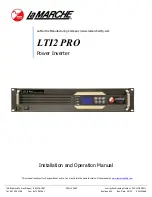
i
Important Safety Instructions
Before using this equipment, read all manuals and other documents related to this inverter and other equipment
connected to this unit. Always have a copy of a
n inverter’
s manual on file nearby, in a safe place; if a replacement
copy of a manual is needed, it can be found at
Electrical Safety
WARNING:
Hazardous voltages are present at the input of power systems. The output from inverters
and batteries may be low in voltage but can have a very high current capacity that may cause severe
or even fatal injury.
When working with any live battery or power system, follow these precautions:
•
Never work alone on any live power system, someone should always be close enough to come to your aid.
•
Remove personal metal items such as rings, bracelets, necklaces, and watches.
•
Wear complete eye protection (with side shields) and clothing protection.
•
Always wear gloves and use insulated hand tools.
WARNING:
Lethal voltages are present within the power system. Parts inside the unit may still be
energized even when the unit has been disconnected from the DC input power. Check with a meter
before proceeding. Do not touch any parts that are not insulated.
•
A licensed electrician should be used in the installation of any unit.
•
Always disconnect the unit from the supply, batteries, and loads before performing maintenance or cleaning.
•
If the unit is hot-swappable, simply remove it from the shelf for any maintenance or cleaning.
•
Always assume that an electrical connection is live and check the connection relative to the ground.
•
Be sure that neither liquids nor any wet material come in contact with any internal components.
•
Do not operate this unit outside the input and output ratings listed on the unit nameplate.
•
Do not use this unit for any purpose not described in the operation manual.
Mechanical Safety
•
This unit or parts of the unit may get very hot during normal operation, use care when working nearby.
•
Do not expose equipment to rain or snow. Always install in a clean, dry location.
•
Do not operate the equipment if it has received a sharp blow, been dropped, or otherwise damaged in any
way.
•
Do not disassemble this unit. Incorrect re-assembly may result in a risk of electric shock or fire.
Battery Safety
WARNING:
Follow all of the battery manufacturer’s safety recommendations when working with or
around battery systems. DO NOT smoke or introduce a spark or open flame in the vicinity of a battery.
Some batteries generate explosive gases during normal battery operation.
•
To reduce the risk of arc, connect, and disconnect the battery only when the unit is off.
•
If it is necessary to remove the battery connections, always remove the grounded terminal from the battery
first.
•
Remove personal metal items such as rings, bracelets, necklaces, and watches.
•
Always wear rubber gloves, safety glasses, and a rubber-lined vest/apron when working near a battery.
•
Have plenty of freshwater and soap nearby in case the battery electrolyte contacts skin, clothing, or eyes.
•
If the battery electrolyte contacts skin or clothing, wash immediately with soap and water.
•
If the electrolyte enters the eye, immediately flood the eye with running cold water for at least ten (10) minutes
and seek medical attention immediately.
•
Do not drop metal on a battery. A spark or short-circuit could occur and could cause an explosion.



































